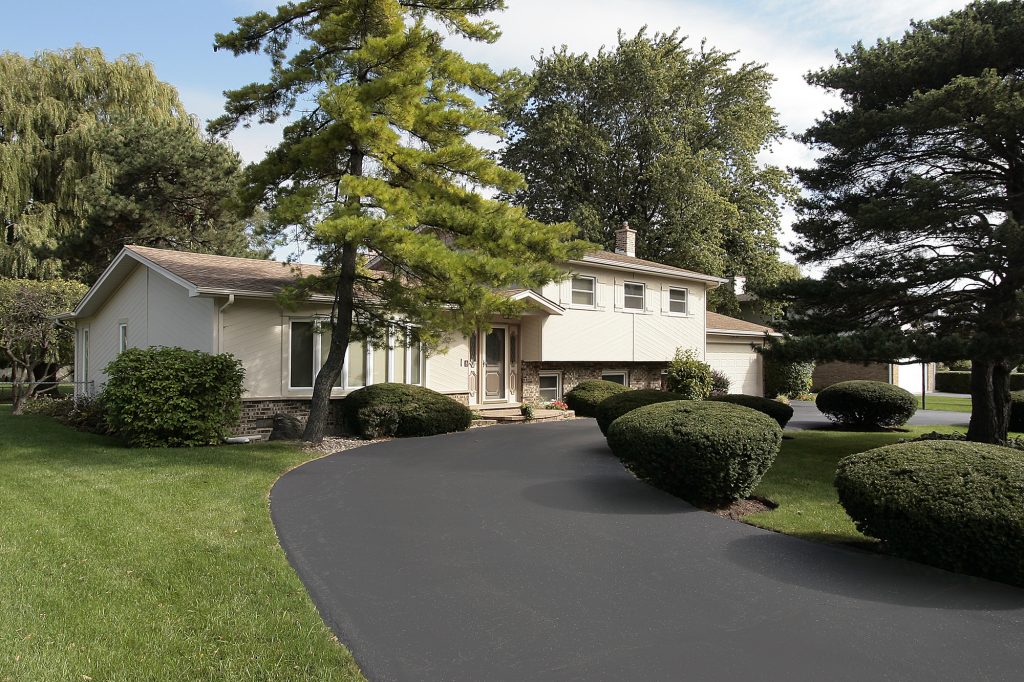Your driveway speaks volumes.
It’s usually among the first things people notice when arriving at your home. That’s why it is so important to take care of it! Your driveway faces daily use and changing weather patterns, making it susceptible to cracking, potholes, and other common pavement issues.
In this article, we discuss common pavement problems many homeowners have, how thick your driveway should be for maximum durability, and specific reasons why maintaining it regularly is absolutely essential. If you’re looking for professional paving services, give us a call today!

Routine Driveway Maintenance is Essential
Over time, your pavement will start to deteriorate from daily wear and tear and vehicle traffic. But, you can help expand the life of the asphalt with regular maintenance! Contaminants such as dirt, oil, mold, and algae can accumulate on the surface and cause major damage. These substances weaken the top layer of asphalt. Mold can even get into cracks and widen them!
To prevent serious issues and premature pavement repairs or even a complete driveway replacement, we recommend you keep your driveway clean and inspect it for any new damage like cracking. Inspections should be a part of your usual exterior home maintenance and happen throughout the year, in every season.
Common Pavement Issues & Repairs
Cracking
There are several types of cracking that are commonly found on driveways.
Block cracks are caused by overly dry asphalt mix and are characterized by square and circular cracking on the topmost layer of the asphalt. These cracks are usually fixed with a simple top-layer sealing.
Slippage cracks go a little deeper and penetrate as they involve both the top and sub-layers of the pavement. These happen when the outer asphalt layer does not stick properly to the under layer. They can also occur when the asphalt has too much sand in it.
Fatigue cracks, or alligator cracks, create a pattern like that of an alligator’s skin as they are small and grouped together. There are several causes of alligator cracks: insufficient water drainage along with extreme temperature and weather changes, constant heavy traffic, and general installation problems. This cracking involves all the layers of asphalt, so more extensive methods like full-depth repairs are needed.
Rutting
Rutting occurs where vehicles’ tires hit the pavement and are caused by repeated heavy traffic. The asphalt dents in where vehicle wheels hit the surface. This results from daily traffic, poor compaction, and/or excess moisture in the asphalt. Areas that are affected by rutting require surface patching to restore the smooth, even surface.
Potholes
When cracking and rutting become severe they can cause potholes. If cracks are not sealed, they will over time allow water to get in, which will expand under freezing temperatures and cause the cracks to widen. This is the perfect opportunity for potholes to develop. They can be filled or patched.
How Thick Should My Pavement Be?
For maximum durability and longer lasting driveways, you need to make sure you have the right asphalt thickness. There are several factors that come into this: the weight, speed, and number of vehicles that will be using the road. For residential driveways, a thickness of about 2 to 3.5 inches is sufficient. However, a commercial parking lot or road that has to endure heavier and more frequent traffic requires a thickness of around 4 or more inches.
Professional Paving Company in Prince Frederick
There are many benefits of hiring a professional paver in your area. A certified and licensed company has the experience and safety standards to get your driveway or commercial lot looking good. Whether you’re filling potholes, sealing cracks, or doing a full replacement, a professional will make sure you’re using the right materials and mixes for the job.